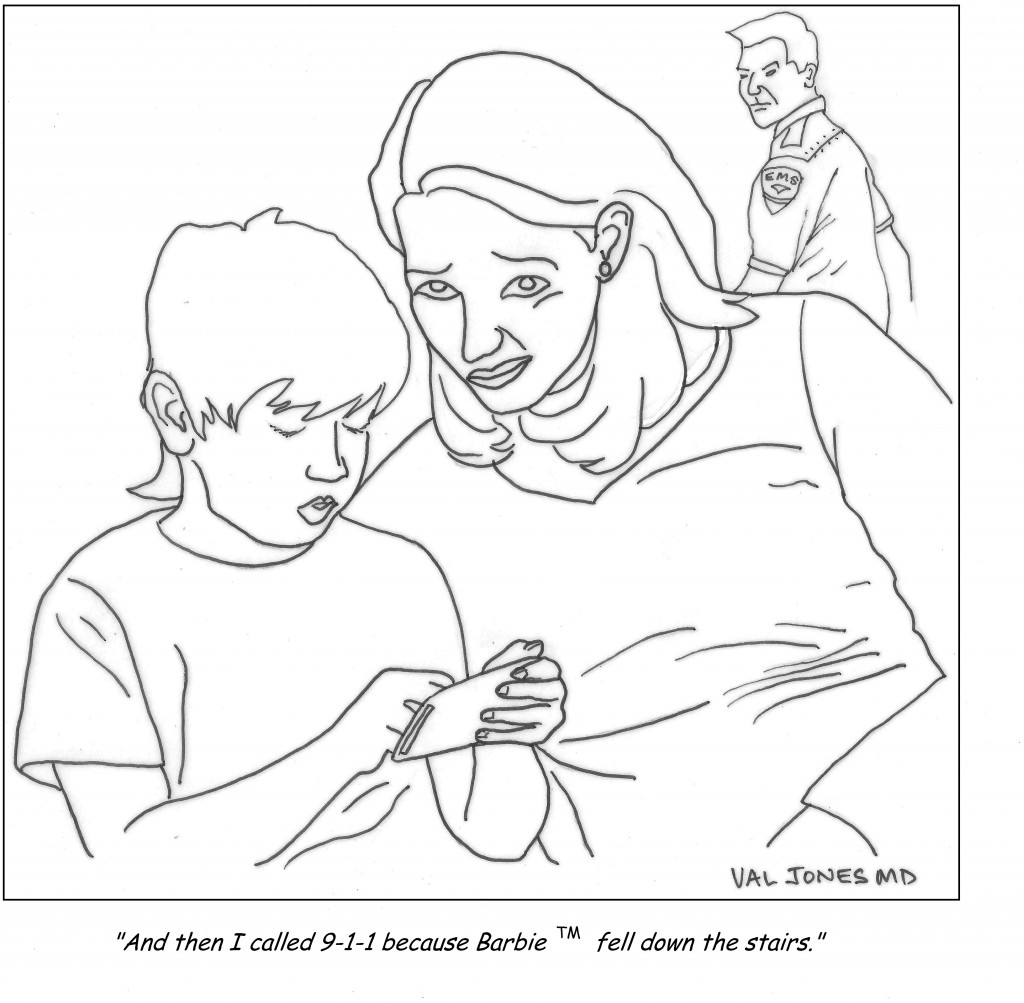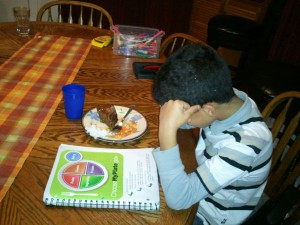Cartoon: That Moment When You Realize Your Child Took Your Emergency Training Very Literally


 Thanks to support from OTCSafety.org, I’ve created a series of health tips for common medical concerns. This week’s article is about how to diagnose and treat sleep difficulties in children and adolescents. There are many possible causes of insomnia, which include everything from emotional distress to bad dreams, breathing problems, stomach pains, medical conditions or behavioral problems.
Thanks to support from OTCSafety.org, I’ve created a series of health tips for common medical concerns. This week’s article is about how to diagnose and treat sleep difficulties in children and adolescents. There are many possible causes of insomnia, which include everything from emotional distress to bad dreams, breathing problems, stomach pains, medical conditions or behavioral problems.
In my article I discuss how you can work with a healthcare professional to determine the cause of your child’s sleep difficulties (this includes details on how to keep a sleep diary). I offer instructive do’s and don’ts to promote healthy sleep, and offer examples of symptoms that may require medical intervention.
For the full article, please click here. I promise it won’t put you to sleep! 😉
 I’ve continued to have terrific email questions and answers with the Boys & Girls Clubs’ Fit Family Challenge participants. I thought I’d publish some of our conversations so that you can participate as well. The Lang family shared this image of their son eating dinner next to the latest USDA dietary recommendations “MyPlate” materials. A picture’s worth 1000 words, isn’t it?
I’ve continued to have terrific email questions and answers with the Boys & Girls Clubs’ Fit Family Challenge participants. I thought I’d publish some of our conversations so that you can participate as well. The Lang family shared this image of their son eating dinner next to the latest USDA dietary recommendations “MyPlate” materials. A picture’s worth 1000 words, isn’t it?
This cute fella is a healthy weight, he is very athletic, and he’s also wondering where chicken nuggets, french fries, and pizza fit in to the MyPlate dinner plans… His mom asked me how to make more “kid friendly” healthy meals. Perhaps some folks reading this have some success stories that they’d like to share? Here’s what I had to say to the Langs and others…
1. My son doesn’t think the MyPlate suggested meals are kid friendly. What can we do?
I wonder if your son would be open to trying healthier variations of the foods he likes? You could make a pretty tasty pizza with whole wheat crust, grilled veggies, a little pesto or tomato sauce and some ham cubes (ham is much lower in fat than sausage or pepperoni) and low fat shredded mozzarella. You can get a pizza stone to help crisp the crust in a regular oven. The pizza would probably reheat well so you could make it in advance too.You can bread chicken strips and bake them (instead of frying them) to simulate healthy chicken “nuggets.” Same for fish sticks. You can try sweet potato fries for a healthier fry option – bake them in the oven with a little olive oil, salt and pepper. More nutritious, kid-friendly recipes may be found at KidsHealth.org
2. Do my kids need 8 cups of water a day?
As far as water is concerned, the amount you need really depends on how much liquid you’re getting from other sources (food, beverages) as well as how much you’re sweating (exercise), how hot/dry the environment is and how much you weigh. Eight cups/day is a very rough rule of thumb. Some people need more or less depending on the day. Unless you are doing extreme exercise (in the heat) that requires fluid replacement before you notice that you’re thirsty, thirst is a good indicator of whether or not you need to drink. Also, I’ll tell you a doctor secret – all you need to know about hydration is in your urine color. Urine becomes very concentrated (dark yellow) when you are dehydrated. If you drink enough water to keep your urine a nice light yellow, then that’s all you need.
3. What are the best vegan protein substitutes for meat?
Concentrated vegetable protein is primarily derived from soy (tofu and tempeh) and wheat (seitan). Nuts and seeds also contain some degree of protein, as well as beans, lentils, and rice. Tofu, tempeh, and seitan can be molded into burger and hotdog shapes and may be prepared to mimic meat flavors. Keep in mind that concentrated soy or wheat proteins may not agree with your intestinal tract (some complain of excessive gas and bloating). So if you have those reactions, at least you’ll know that it’s quite common.
4. Is it healthy to be a vegetarian? Is there such a thing as too much fruit and veggies?
Vegetarianism can be healthy, though it takes some effort to ensure that adequate amounts of nutrients are received – especially if you’re vegan (no dairy, no eggs). The most common deficiencies for vegans are iron, B12, calcium, Omega-3 fatty acids, protein, and Vitamin D. (You can read more about how vegetarians can overcome these deficiencies here.) I guess my main concern with veganism is the low omega-3s. It is basically impossible to get enough omega-3 fatty acids from plant sources (certain seeds, you may have heard, have a good amount of omega-3 fatty acids but what they won’t tell you is that plant omega-3’s aren’t processed by the body so they remain inactive and don’t provide much benefit.) Omega 3 fatty acids form a protective layer on the outside of cell membranes by reducing inflammation. This is particularly helpful in the reduction of plaque build up in heart arteries, and reducing the risk of various dementias (such as Alzheimer’s) that have an inflammatory cause.
Excellent sources of omega 3 fatty acids are oily fish (sardines, salmon, mackerel, sea bass). This is why the American Heart Association (and MyPlate.gov) recommend 2 servings of oily fish/week for optimal health. Vegetarians are missing out on this important benefit.
As far as eating too many fruits/veggies is concerned – I can’t think of too many potential harms from eating large amounts of fruits/veggies (other than weight gain if you really eat a lot of fruit – they have quite a bit of natural sugar). The real harm comes from excluding vital nutrients by eating plants exclusively (without a careful strategy to get the right plant sources of vitamins and minerals, along with omega-3 supplements).

Photograph: Roger Bamber
How far do we travel from our parents’ patterns? A question psychotherapists and their clients have been wrestling with for decades.
We can’t escape the parental imprint. Some of us may not want to. But those of us who did hope to be different often find ourselves in our 40s or 50s unexpectedly leaking parental behaviors or attitudes we thought we had purged ourselves of in our 20s.
I sometimes hear myself saying to Richard, my partner, as he heads out the door for his Tae Kwon Do class, “Be careful.” He has a second degree black belt and has been studying for years. He is always careful. My admonition is a spillover of my father’s anxious voice warning me to be on the lookout for endless, unnamed dangers hiding in plain sight at every turn. Other times I see myself tighten up like a fist when something I thought I had control over twists in an unpredictable direction. It is not my jaw that clenches in agitation; it is my mother’s jaw, on my face.
How our parents do or did illness is a powerful pattern. Did they suffer in silence, while allowing no one to offer tenderness or help? Did they submerge into illness and allow it to define who they were? Did they use illness to control and manipulate? To get attention? Did they remain engaged in living and loving? Did they learn from illness to become more fully who they were? Did they become nastier to each other? Or sweeter? And finally, did they take care of each other — physically and emotionally?
My parents, who kept each other at a distance when well, became even more separated when ill. They went so far as to resent each other for their increasing incapacities. It was not pretty.
There were times when I was in the thick of my pain condition, that I isolated and withdrew from Richard. But more often, I allowed my pain to teach me to reach out for comfort and connection. I had to. For me, the voice of pain was more powerful than my parents’ example.
Dealing with illness can be a consuming job. When you find yourself behaving in ways that don’t create the kind of bridge to your partner that will help lighten the load for both of you, pause and ask yourself: “Am I playing out a pattern that doesn’t really belong to me? Whose voice am I speaking with? Can I do it differently?”
How did your parents deal with illness? What did you learn to do and not to do from them?
***
Barbara Kivowitz is a psychotherapist, business consultant, and book author. She blogs regularly at In Sickness And In Health.
Why would a pediatrician draw blood from your 9-, 10-, or 11-year-old at his or her next annual wellness visit? Because the American Academy of Pediatrics (AAP) recently endorsed updated guidelines that call for checking LDL (bad) cholesterol levels in all kids between the ages of 9 and 11.
The cholesterol-test recommendation created quite a stir. But wait, there’s more. The guidelines also call for annual blood pressure checks beginning at age 3, and periodic blood sugar measurements starting between ages 9 to 11. There’s also a strong recommendation for kids and adolescents to limit sedentary screen time to two hours or less per day, and to get at least an hour a day of moderate physical activity.
The biological basis for these guidelines is that atherosclerosis (the fatty gunk in arteries that causes heart attacks, strokes, and other serious problems) starts during youth. In many cases, Read more »
*This blog post was originally published at Harvard Health Blog*
It’s no secret that doctors are disappointed with the way that the U.S. healthcare system is evolving. Most feel helpless about improving their work conditions or solving technical problems in patient care. Fortunately one young medical student was undeterred by the mountain of disappointment carried by his senior clinician mentors…
I am proud to be a part of the American Resident Project an initiative that promotes the writing of medical students residents and new physicians as they explore ideas for transforming American health care delivery. I recently had the opportunity to interview three of the writing fellows about how to…
Book Review: Is Empathy Learned By Faking It Till It’s Real?

I m often asked to do book reviews on my blog and I rarely agree to them. This is because it takes me a long time to read a book and then if I don t enjoy it I figure the author would rather me remain silent than publish my…
The Spirit Of The Place: Samuel Shem’s New Book May Depress You

When I was in medical school I read Samuel Shem s House Of God as a right of passage. At the time I found it to be a cynical yet eerily accurate portrayal of the underbelly of academic medicine. I gained comfort from its gallows humor and it made me…
Eat To Save Your Life: Another Half-True Diet Book

I am hesitant to review diet books because they are so often a tangled mess of fact and fiction. Teasing out their truth from falsehood is about as exhausting as delousing a long-haired elementary school student. However after being approached by the authors’ PR agency with the promise of a…